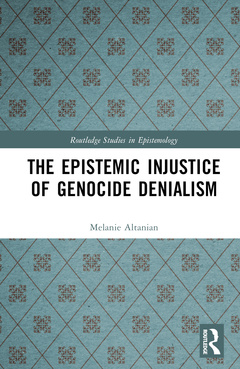Description
The Epistemic Injustice of Genocide Denialism
Routledge Studies in Epistemology Series
Language: English
Keywords
Melanie Altanian; epistemic injustice; genocide denialism; social epistemology; political epistemology; genocide denial; dignity; memory; marginalization; truth; powerlessness; collective amnesia; organized forgetting; epistemic agency; Miranda Fricker; Armenian genocide; hermeneutical oppression; testimony; testimonial injustice; impunity; ignorance; discriminatory epistemic injustice; silencing; misremembrance
· 15.2x22.9 cm · Hardback
Description
/li>Contents
/li>Readership
/li>Biography
/li>
The injustice of genocide denial is commonly understood as a violation of the dignity of victims, survivors, and their descendants, and further described as an assault on truth and memory. This book rethinks the normative relationship between dignity, truth, and memory in relation to genocide denial by adopting the framework of epistemic injustice.
This framework performs two functions. First, it introduces constructive normative vocabulary into genocide scholarship through which we can gain a better understanding of the normative impacts of genocide denial when it is institutionalized and systematic. Second, it develops and enriches current scholarship on epistemic injustice with a further, underexplored case study. Genocide denialism is relevant for political and social epistemology, as it presents a substantive epistemic practice that distorts normativity and social reality in ways that maintain domination. This generates pervasive ignorance that makes denial rather than recognition of genocide appear as the morally and epistemically right thing to do. By focusing on the prominent case of Turkey?s denialism of the Armenian genocide, the book shows the serious consequences of this kind of epistemic injustice for the victim group and society as a whole.
The Epistemic Injustice of Genocide Denialism will appeal to students and scholars working in social, political, and applied epistemology, social and political philosophy, genocide studies, Armenian studies, and memory studies.
Introduction Part 1: Genocide and Genocide Denialism 1. On Genocide Denial 2. An Epistemology of Genocide Denialism Part 2: The Epistemic Injustice of Genocide Denialism 3. The Wrong of Discriminatory Epistemic Injustice 4. Genocide Denialism, Misremembrance and Hermeneutical Oppression 5. Conversational Genocide Denial and Testimonial Oppression Concluding Remarks
Melanie Altanian is Assistant Professor at the University of Freiburg, Chair of Epistemology and Theory of Science. Previously, she was a guest lecturer and research assistant at University College Dublin, School of Philosophy. She recently published (together with Maria Baghramian) the edited volume, Testimonial Injustice and Trust (2024) for Routledge.
These books may interest you

Epistemic Autonomy 160.25 €



